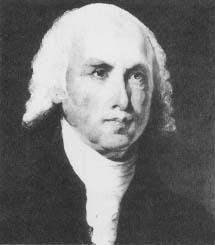Marbury v. Madison: 1803
Marbury Goes To Court
Having demonstrated his power, Jefferson ultimately allowed most of the Adams appointees to take their offices. One of the appointees that Jefferson did not allow to take office, William Marbury, filed a petition with the Supreme Court December 16, 1801 requesting that the Supreme Court order Madison to deliver Marbury's commission. Marbury was joined by three other disappointed appointees, William Harper, Robert R. Hooe, and Dennis Ramsay. Of course, by now Marshall had been the chief justice for over nine months. Under the Judiciary Act of 1789, the Supreme Court had the power to issue the order Marbury requested, called a "writ of mandamus."
On December 18, 1801, Marshall ordered a hearing on Marbury's petition, to take place at the Court's next session, the
 Portrait of Secretary of State James Madison, defendant in Marbury v. Madison, which established the principle of judicial review.
Portrait of Secretary of State James Madison, defendant in Marbury v. Madison, which established the principle of judicial review.
Lee argued that Madison, as secretary of state, was not only an official of the executive branch, bound to obey the president, but a public servant obligated to perform his duty and deliver Marbury's lawful commission. Therefore, the Court must exercise its authority under the Judiciary Act to issue a writ of mandamus against Madison. Attorney General Lincoln said practically nothing, except that the issue of the commissions was purely political and thus not subject to the judiciary.
Additional topics
- Marbury v. Madison: 1803 - Marshall Proclaims The Doctrine Of Judicial Review
- Other Free Encyclopedias
Law Library - American Law and Legal InformationNotable Trials and Court Cases - 1637 to 1832Marbury v. Madison: 1803 - Marbury Goes To Court, Marshall Proclaims The Doctrine Of Judicial Review, Suggestions For Further Reading